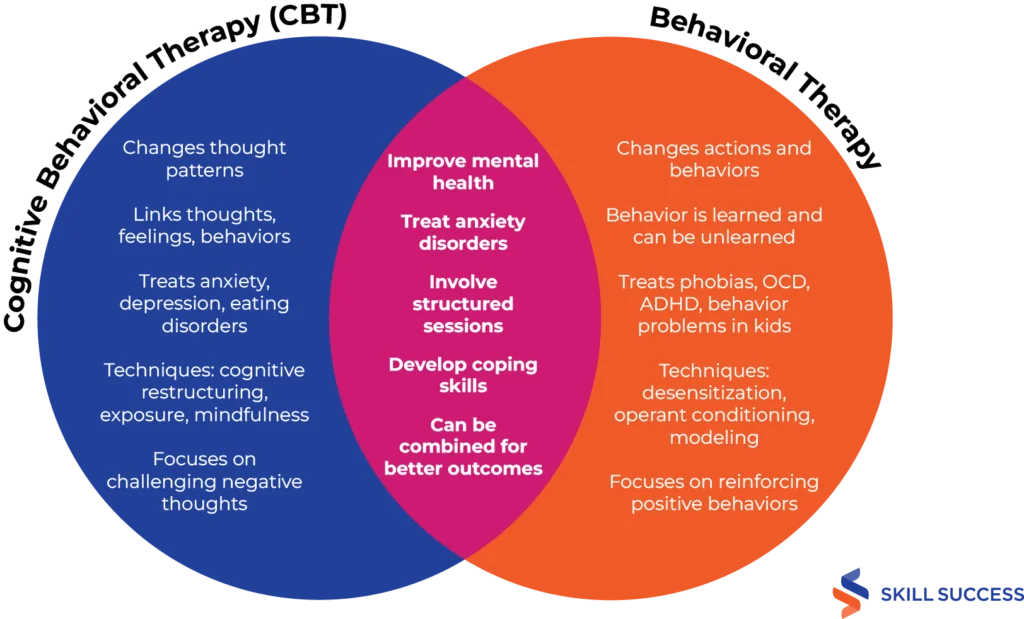Cognitive Behavioral Therapy (CBT) and Behavioral Therapy are two common types of therapy for mental health conditions. Both can help people manage anxiety symptoms and develop coping skills, but they work differently. Let's discuss both in the context of learning self-development.
What is Cognitive Behavioral Therapy (CBT)?
Cognitive Behavioral Therapy helps people see how connected their thoughts, feelings, and actions are. This therapy teaches ways to change thought patterns. The therapy helps in mental health conditions like anxiety and eating disorders. The main idea is that changing how we think can change how we feel and act, helping people cope better.
Here’s how it works:
- Identify negative thoughts: The therapist helps the person find thoughts that make them feel bad.
- Challenge thoughts: They discuss if these thoughts are true or if there’s another way to see things.
- Change the thoughts: The person learns to think more positively or realistically.
For example, if someone thinks they always mess up, CBT helps them see otherwise. They might have some clarity that it's normal to make mistakes and they can do other things well.
Here's when to choose Cognitive Behavioral Therapy (CBT):
- When you need to address negative thought patterns.
- If you are dealing with an eating disorder.
- When the focus is on changing both thoughts and behaviors.
- If you want to develop coping strategies for anxiety and depression.
What is Behavioral Therapy?
Behavioral Therapy focuses on changing actions, not thoughts. This type of therapy is particularly useful for addressing mental illness and maladaptive behaviors, including those associated with substance use disorders. The main idea is that people learn behavior in therapy. What is learned can be unlearned.
Here’s how it works:
- Identify problem behaviors: The therapist and person find actions that cause trouble.
- Learn new behaviors: They practice doing things differently.
- Reinforce positive behaviors: Good actions are rewarded for encouragement.
For example, if someone fears dogs, Behavioral Therapy can help them gradually become accustomed to dogs. They might start by looking at pictures of dogs, then watch dogs from a distance, and finally, pet a dog.
Here's when to choose Behavioral Therapy:
- When the primary focus is on changing specific behavior patterns.
- If you need exposure therapy to manage phobias or anxiety disorders.
- When treating conditions such as substance use disorders.
- If the goal is to modify learned behaviors through techniques like systematic desensitization.
Key Differences
- Focus: CBT looks at thoughts and feelings, while Behavioral Therapy focuses on actions.
- Techniques: CBT involves talking and thinking, while Behavioral Therapy often includes practicing new behaviors.
- Goal: Both aim to help people feel better, but they use different methods to get there.
Which One is Better?
No one-size-fits-all answer exists for choosing therapy. Some people do better with CBT, which changes thought patterns. Others find Behavioral Therapy, which changes behavior patterns, more helpful.
It depends on the person and their issues, like anxiety or substance use disorders. Sometimes, therapists use a mix of both to help their clients improve over the long term.
If you're looking for ways to track your progress and stay organized during your therapy journey, use Notion. This versatile productivity tool combines note-taking, task management, project planning, and collaboration features into a single platform, making it easier to manage your mental health and personal development goals.

Take These Online Courses to Learn More

Cognitive Behavioral Therapy And Counseling
The course teaches how CBT can change negative feelings and behaviors. It also provides a thorough understanding of the process. It covers essential principles, making it accessible for both beginners and experienced practitioners.
This course covers CBT principles, like the CBT triangle, understanding emotions, and recognizing thoughts, feelings, and behaviors. It offers practical strategies for challenging and changing negative patterns.
I found this course packed with useful knowledge for personal and professional growth, with practical tips and real-world examples.
Who is this course for?
This is perfect for beginners and experienced practitioners wanting to improve their CBT knowledge. It's detailed but easy to follow.
TAKE THIS COURSECognitive Behavioral Therapy For Depression, Anxiety, Phobias And Panic Attacks
This course teaches effective CBT strategies to manage depression, anxiety, phobias, and panic attacks. By the end, you'll learn practical methods to improve your well-being and take control of your mental health.
This course helps you become your own therapist by teaching practical strategies for current and future problems. It offers quick, clear solutions for issues like depression, anxiety, and phobias.
I believe this is beneficial for anyone wanting to take charge of their mental health. Its practical approach and self-empowerment focus make it an excellent resource for improving well-being.
Who is this course for?
This course is for people dealing with mental health issues. It teaches you about CBT, which can help you control and overcome negative thoughts, emotions, and actions.
TAKE THIS COURSEFrequently Asked Questions
What are some examples of CBT techniques?
Methods to help with anxiety include changing negative thoughts, facing fears gradually, and staying present and aware through mindfulness.
What are some examples of Behavioral Therapy techniques?
Techniques include systematic desensitization (gradually facing fears), operant conditioning (using rewards and consequences), and modeling (learning by watching others).
Which problems can CBT help with?
CBT is effective for issues like anxiety, depression, stress, phobias, and eating disorders.
Which problems can Behavioral Therapy help with?
Behavioral Therapy can help with phobias, obsessive-compulsive disorder (OCD), ADHD, and behavior problems in children.
Can CBT and Behavioral Therapy be combined?
Yes, therapists often combine elements of both therapies to provide the best treatment for the individual.

Key Takeaways
Cognitive Behavioral Therapy and Behavioral Therapy are both useful tools for dealing with problems. CBT helps change negative thoughts, and Behavioral Therapy helps change negative behaviors. Understanding how each works can help people choose the best therapy for their needs.
If you want to learn more about mental health and personal development, sign up at Skill Success All Access Pass. Access thousands of online courses to improve your well-being, enhance your skills, and reach your goals.

